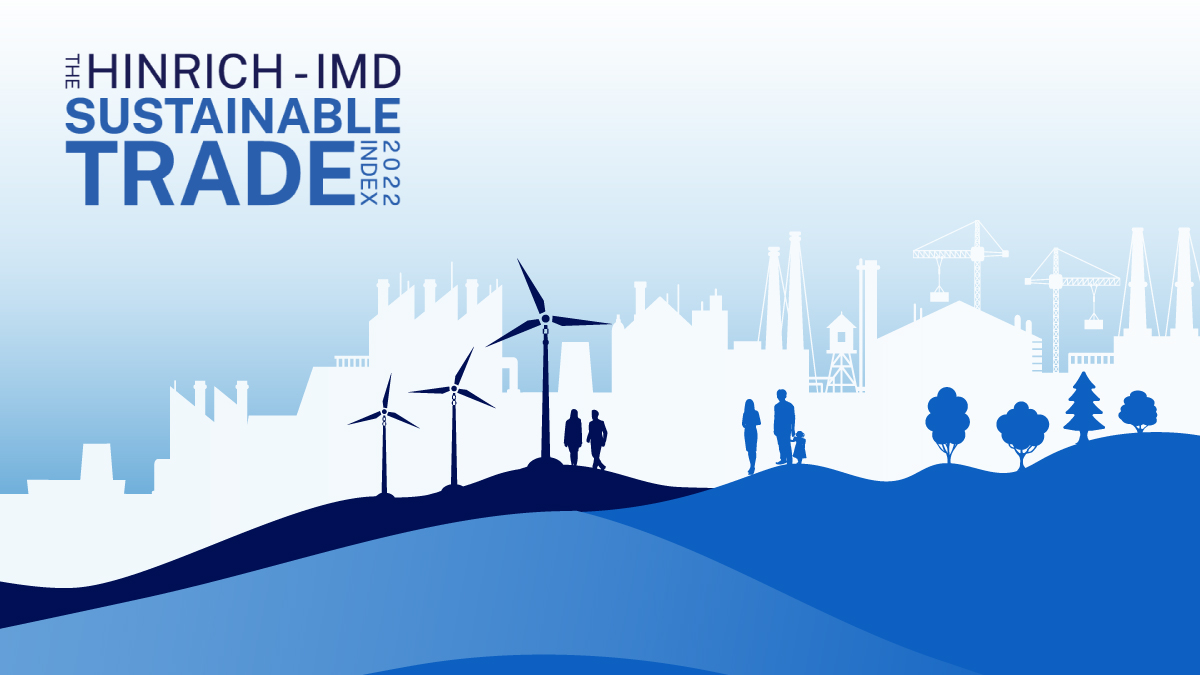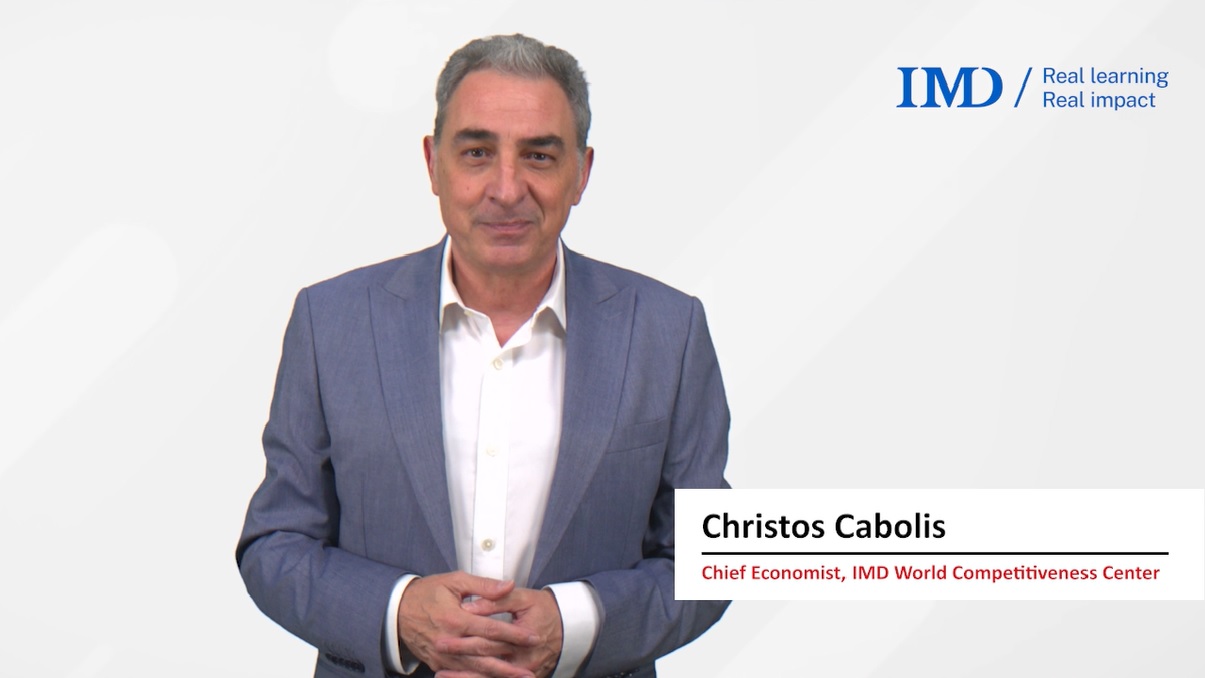Hinrich Foundation and IMD release new sustainable trade index 2022
Published 08 November 2022
The Hinrich-IMD Sustainable Trade Index (STI) 2022 sheds light on how trade interplays with national prosperity. New Zealand has ranked first, the UK second, and Hong Kong third in the index.
The findings from this publicly available research give detailed insights into the diversity of policies and practices in major economies, how economies are sustaining growth and equitable prosperity by managing their trade and trade-related regulations, and the linkages between trade and sustainability. The Index represents a key resource for regulators, businesses, and communities to shape policies that integrate sustainably conducted trade with the prosperity of economies.
The Index measures 30 economies’ readiness and capacity to participate in the global trading system by analyzing 70 data points (“indicators”) grouped into three “pillars” [1] that align with the long-term goals of economic growth, environmental protection, and societal development.
This year’s study identified commonalities among high-performing economies:
- They tend to encourage technological innovation and have low trade barriers.
- Their residents have high life expectancy, attend school for longer periods, and enjoy more opportunities to move up in life.
- They conserve energy at home, and respect climate goals globally.
The Index also reveals some worrying trends. From the pandemic to the Russia-Ukraine war, uncertainties are pressing economies to turn inward in search of self-sufficiency. Inflation is increasing. Growth is slowing. The Index shows new tariffs rising among the world’s biggest economies including China and the US. The latter’s economic ranking is dragged down by its relatively high tariff and non-tariff barriers to trade.
Overall rankings
New Zealand tops the Index by placing first in both the Societal and Environmental pillars, and seventh in the Economic pillar.
It tops the measure for political stability. It ranks third in labor standards, an indicator that measures gender diversity in hiring outcomes. It strongly upholds freedom of association and assembly. It has mostly eliminated or avoided using forced labor or child labor in its economic output. New Zealand also enjoys the least polluted air of all economies assessed.
The UK’s second place is the net result of strong performances across all pillars. It ranks second for keeping its energy intensity low, and third in the percentage of wastewater treated, transfer emissions, and carbon management.
Hong Kong’s third position stems from its top position in the Economic pillar. Together with Singapore (fifth), it excels in attracting capital from foreign investors and has a well-developed technological infrastructure.
Japan’s performance (fourth) is an amalgam of high rankings across all pillars. It tops the societal pillar for avoiding goods produced by forced labor or child labor and for its high social mobility, ranking first in both. Other strengths are life expectancy at birth and political stability.
Even the top performers carry red flags in their policy management. The top five economies in the Societal pillar still have high levels of imports of products made in economies that engage in modern slavery.
“The findings are a sobering indication of how the appetite of developed economies is driving forced labor, often more than we imagine. We hope they rally our wider policy, business, and academic communities to discuss solutions. We need to know more about our supply chains,” said Chuin Wei Yap, Program Director, International Trade Research at the Hinrich Foundation.
“This year, as the pandemic ebbs, we are living with a new danger. Global trade is in crisis. Political leverage has supplanted comparative advantage. These global developments are a reminder of why sustainable trade is more critical than ever before,” he added.
Christos Cabolis, Chief Economist at the IMD World Competitiveness Center (WCC), which partnered with the Hinrich Foundation for this Index, added, “International trade is a fundamental component of value creation, and therefore of the economic growth of countries that participate in it. Even though business leaders have shifted their focus to more company-specific operational challenges, the interdependency and interconnectedness of economies with respect to the flow of goods, services, people, capital, and ideas continues to be strong – and, therefore, the importance of sustainability in its widest sense remains high. Sustainable trade must be a focus of public decision makers navigating their countries’ strategies while striving to reach the United Nations Sustainable Development Goals for 2030.”
New Zealand, the UK, and Japan all share the same weakness of their ecological footprint (21st, 17th and 20th, respectively). Renewable energy is also a shortcoming in the performance of the UK and Japan (17th and 22nd, respectively).
IMD, with campuses in Lausanne and Singapore, has partnered on this Index with the Singapore-based Hinrich Foundation for the first time this year, revamping the study to include 30 economies – up from 20, and now including those in the Asia-Pacific Economic Cooperation (APEC) and current and potential members of the Comprehensive and Progressive Agreement for Trans-Pacific Partnership (CPTPP).
In previous editions, the STI was produced every two years, but as of this edition it will be created on an annual basis. IMD’s WCC also produces yearly rankings on world competitiveness, digital competitiveness, talent (to be released on 8 December 2022), and smart cities. It has put sustainability – which it considers to be synonymous with competitiveness – at the core of its research, making it a leading center within IMD.
“Globalization and sustainability are at odds with each other,” said Professor Arturo Bris, Director of the IMD World Competitiveness Center, which led the project for IMD. “Companies and countries have used global trade and sourcing in order to maximize financial returns, but we are now acutely aware that this compromises sustainability to the extent that energy is consumed and natural resources are depleted. Therefore, governments and corporate leaders alike must balance these two effects, and ask: ‘How do we support our economies while preserving ESG objectives?’”
Notes to Editors
About the Hinrich Foundation
The Hinrich Foundation is an Asia based philanthropic organization that works to advance mutually beneficial and sustainable global trade. It supports original research and education programs that build understanding and leadership in global trade.
About IMD
IMD is an independent academic institution with Swiss roots and global reach, founded over 75 years ago by business leaders for business leaders. Since its creation, IMD has been a pioneering force in developing leaders who transform organizations and contribute to society.
Based in Lausanne and Singapore, IMD has been ranked in the top three of the annual FT’s Executive Education Global Ranking worldwide for executive education (combined ranking for open and custom programs) since 2012, and in the top five for more than 15 consecutive years.
This consistency at the forefront of its industry is grounded in IMD’s unique approach to creating “Real Learning. Real Impact”. Led by an expert and diverse faculty, IMD strives to be the trusted learning partner of choice for ambitious individuals and organizations worldwide. Challenging what is and inspiring what could be.
[1] The Economic pillar quantifies how well economies are fostering economic growth through international trade, e.g. the quality of trade infrastructure, the ease of conducting international trade, export diversification in bilateral trade partnerships, and export goods concentration. The Societal pillar captures the social factors that contribute to economies’ long-term capacity to conduct trade, e.g. education levels and labor standards, which feed the development of human capital. The Environmental pillar measures the extent to which a country uses natural resources and manages the externalities arising from its economic growth and participation in the global trading system.
© The Hinrich Foundation. See our website Terms and conditions for our copyright and reprint policy. All statements of fact and the views, conclusions and recommendations expressed in this publication are the sole responsibility of the author(s).




